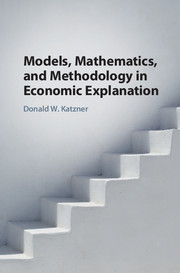Book contents
- Frontmatter
- Dedication
- Contents
- Preface
- Introduction
- 1 Science and Economics
- 2 Economic Models and Explanation
- 3 The Stages of Model Building in Economics
- 4 Models and Mathematics
- 5 Models and Measurement (or Lack Thereof)
- 6 Issues Relating to the Construction of Models from Scratch
- 7 An Example: The Efficiency of Organizational Forms
- 8 The Implicit Assumption Requirements of Later-Stage Model Building
- 9 Ordinality and the Adequacy of Analytic Specification
- 10 Categories of Models
- 11 Conclusion
- Index
11 - Conclusion
Published online by Cambridge University Press: 26 October 2017
- Frontmatter
- Dedication
- Contents
- Preface
- Introduction
- 1 Science and Economics
- 2 Economic Models and Explanation
- 3 The Stages of Model Building in Economics
- 4 Models and Mathematics
- 5 Models and Measurement (or Lack Thereof)
- 6 Issues Relating to the Construction of Models from Scratch
- 7 An Example: The Efficiency of Organizational Forms
- 8 The Implicit Assumption Requirements of Later-Stage Model Building
- 9 Ordinality and the Adequacy of Analytic Specification
- 10 Categories of Models
- 11 Conclusion
- Index
Summary
The task of science, it was stated as the present point of view at the beginning, is to explain. Explanation is a human activity and is to be distinguished, on both philosophical and practical grounds, from description. To describe a thing or a complex of events is to state what it is. To explain the thing is to discover the purported reason for its being, the purported causation that makes it what it is and, to the degrees that may be achievable, to provide a means for projecting what future values of the thing may arise. Explanation, then, involves the statement of the place the thing explained occupies in total existent reality. While it might give grounds for prediction of future outcomes of actions or events, it follows that explanation and prediction (i.e., the actual projection of future values) are very different intellectual activities. Moreover, by reason of the insurmountable entanglements of the reality under investigation, both description and explanation at any moment of time must necessarily be partial and incomplete. And, in addition, explanation, in the form of scientific hypotheses, for example, is tentative to varying degrees, often awaiting confirmation or disproof depending on what is held as the logical or methodological significance of the explanatory procedure.
Against such realizations, the preceding chapters have been motivated by two awarenesses. First is the importance of understanding that there are significant distinctions between explanatory enterprise in the physical sciences and in economics. In sharp contrast with the former, the objects of explanation in the latter are the actions of sentient, often rational and responsible decision-making agents, and it is therefore imperative to take account of the nature of, and the reasons for, the decisions they make, along with the outcomes that follow as a result. For this reason and for the numerous additional reasons stated in Chapter 1, it was concluded there that an epistemological parity between physical and economic sciences does not exist. Second, due to the complexity of real-world environments and affairs, the disparity between description and explanation in economics is particularly acute. As a result, economic explanation, as it differs from economic description, often takes the form of model building, with all of the abstractions from, and simplifications of, reality that models inevitably imply and which have been referred to in the foregoing.
- Type
- Chapter
- Information
- Models, Mathematics, and Methodology in Economic Explanation , pp. 234 - 240Publisher: Cambridge University PressPrint publication year: 2017



